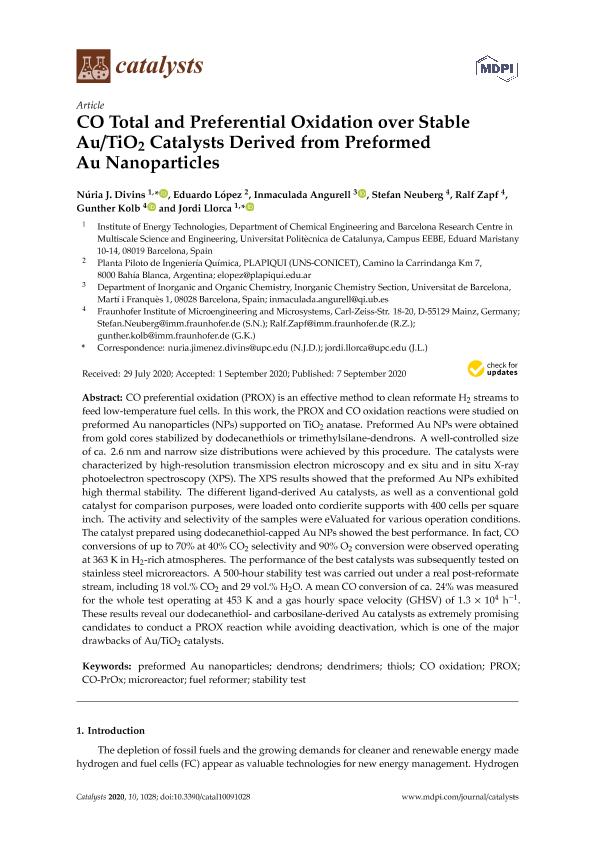Artículo
CO Total and preferential oxidation over stable Au/TiO2 catalysts derived from preformed au nanoparticles
Divins, Núria J.; Lopez, Eduardo ; Angurell, Inmaculada; Neuberg, Stefan; Zapf, Ralf; Kolb, Gunther; Llorca Piqué, Jordi
; Angurell, Inmaculada; Neuberg, Stefan; Zapf, Ralf; Kolb, Gunther; Llorca Piqué, Jordi
 ; Angurell, Inmaculada; Neuberg, Stefan; Zapf, Ralf; Kolb, Gunther; Llorca Piqué, Jordi
; Angurell, Inmaculada; Neuberg, Stefan; Zapf, Ralf; Kolb, Gunther; Llorca Piqué, Jordi
Fecha de publicación:
07/09/2020
Editorial:
Molecular Diversity Preservation International
Revista:
Catalysts
ISSN:
2073-4344
Idioma:
Inglés
Tipo de recurso:
Artículo publicado
Clasificación temática:
Resumen
CO preferential oxidation (PROX) is an effective method to clean reformate H2 streams to feed low-temperature fuel cells. In this work, the PROX and CO oxidation reactions were studied on preformed Au nanoparticles (NPs) supported on TiO2 anatase. Preformed Au NPs were obtained from gold cores stabilized by dodecanethiols or trimethylsilane-dendrons. A well-controlled size of ca. 2.6 nm and narrow size distributions were achieved by this procedure. The catalysts were characterized by high-resolution transmission electron microscopy and ex situ and in situ X-ray photoelectron spectroscopy (XPS). The XPS results showed that the preformed Au NPs exhibited high thermal stability. The different ligand-derived Au catalysts, as well as a conventional gold catalyst for comparison purposes, were loaded onto cordierite supports with 400 cells per square inch. The activity and selectivity of the samples were evaluated for various operation conditions. The catalyst prepared using dodecanethiol-capped Au NPs showed the best performance. In fact, CO conversions of up to 70% at 40% CO2 selectivity and 90% O2 conversion were observed operating at 363 K in H2-rich atmospheres. The performance of the best catalysts was subsequently tested on stainless steel microreactors. A 500-hour stability test was carried out under a real post-reformate stream, including 18 vol.% CO2 and 29 vol.% H2O. A mean CO conversion of ca. 24% was measured for the whole test operating at 453 K and a gas hourly space velocity (GHSV) of 1.3 × 104 h−1. These results reveal our dodecanethiol-and carbosilane-derived Au catalysts as extremely promising candidates to conduct a PROX reaction while avoiding deactivation, which is one of the major drawbacks of Au/TiO2 catalysts.
Archivos asociados
Licencia
Identificadores
Colecciones
Articulos(PLAPIQUI)
Articulos de PLANTA PILOTO DE INGENIERIA QUIMICA (I)
Articulos de PLANTA PILOTO DE INGENIERIA QUIMICA (I)
Citación
Divins, Núria J.; Lopez, Eduardo; Angurell, Inmaculada; Neuberg, Stefan; Zapf, Ralf; et al.; CO Total and preferential oxidation over stable Au/TiO2 catalysts derived from preformed au nanoparticles; Molecular Diversity Preservation International; Catalysts; 10; 9; 7-9-2020; 1-20
Compartir
Altmétricas



